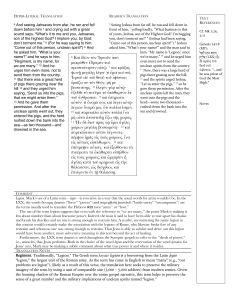
For the last several years, I’ve been working on translating the Gospel of Mark, a project whose enjoyment is only exceeded by the amount of time it’s taking me. Part of this is that I’m trying to translate it twice, in two radically different ways, while including commentary and translation notes. (See, the illustration at right)
As I near the end of my first draft of the translation, I came to the passion narratives and in so doing, stumbled across something interesting in one of the Good Friday scenes.
The Roman governor Pontius Pilate is honoring a tradition that a prisoner go free at the Passover holiday. Two criminals are presented before the crowds for them to chose: Jesus and Barabbas. The crowd, agitated by the religious leadership, choose Barabbas.

And here is where looking closely at the text yielded something surprising.
Barabbas’s name (בר־אבא bar-abba) means “son of the father” while Jesus is “Son of the Father.” In Matthew’s gospel Barabbas is even identified as Jesus Barabbas. (This is not a new observation and has been frequently made.)
But further, Barabbas is described as an insurrectionist (στασιαστής stasiastēs) who had committed murder during the uprising (στάσις stasis). Both words are from the verb ἵστημι histēmi which means “to stand” and which is at the root of the word ἀνάστασις anastasis, meaning “resurrection” (lit. “standing up again”).
Thus, the crowd is being presented with the choice of [Jesus] son-of-the-father, an upriser; and Jesus, Son of the Father, an Up-Riser.
They make the wrong choice.
But, it bears noting, frequently so do we.





